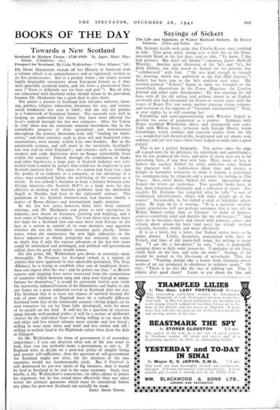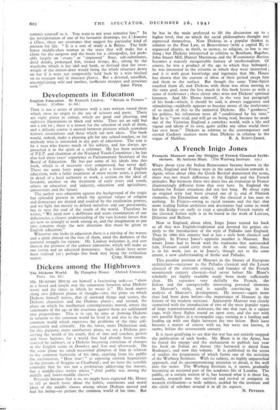Sayings of Sickert
The Life and Opinions of Walter Richard Sickert. By Robert Emmons. (Faber and Faber. 25s.)
MR. SICKERT recalls with pride that Charles Keene once confided in him. That great artist, sitting over a little lire in the Ham- mersmith Road in his last days, said to him, " Ye know, I like bad pictures. But don't tell Jimmy "—meaning James McNeill Whistler. Another great illustrator of the '6o's and '70's, Sir John Gilbert, not only posed to Sickert for his portrait, but " collaborated " with him. (" He was kind enough to retouch the drawing, which was published in the Pall Mall Gazette.") Sickert has been true to the '6o's tradition ever since. His recently-painted " Echoes," begun in 1926, are founded on the wood-block illustrations in the Penny Magazine, the London Journal and other early threepennies. He was courting his old love, with all the old ardour and without shame in an English art-world that had resounded for fifteen or twenty years with the voices of Roger Fry and many another praising vision, volumes and recession at the expense of " Victorian sentimentality." Now, at over eighty, he is still courting her.
Friendship and semi-apprenticeship with Whistler helped to develop his sense of proportion as a painter. Intimacy with Degas modified Whistlerian ideas, and propagated new ones. Talk with Wilson Steer, irritation with George Moore, warm friendships, warm enmities and constant studies from the life —a wonderful half-theatrical life, heightened and yet always real, ordinary and yet very rare—these have helped to make him a great painter.
This is not a perfect biography. The author takes the edge off a good story. by his defences, his repetitions and underlinings ; but he has produced the facts, and most of them turn out to be interesting facts, if you bear with him. Here, more or less, is Sickert the teacher, Sickert the witty, malicious critic, Sickert the character with a fecklessness about time and money, a delight in humanity whenever he finds it human, a preference for communicating by telegram and a passion for writing to The Times. Also, more dimly, Sickert the artist. Quotations from Sickert the writer are numerous. Two possible books have, in fact, been telescoped—biography and a collection of essays. Ex- cusably, Dr. Emmons has compiled what he calls " a sort of sublimated advertisement, which will make people go to the source." Inexcusably, he has failed to stick to legitimate adver- tising. By page 69 he is writing: " It is a question whether future generations will not perhaps recognise that it was left to Walter Sickert rather than to Cezanne ' to make of Impres- sionism something solid and durable like the old masters.' " And later on he becomes heavy and moral with painters, critics and schools about whom his hero (and ours) has alread! written critically, heatedly, wittily and more effectively.
It is as a lover, not a hater, that Sickert writes best—as he paints always. Lively, discursive, punctuated with lines of French, and lines of old music-hall songs, his writing is never flat. " I am like a bus-driver," he says, " who is perpetually jumping down to fight some passer-by. I apologise to my fares, climb back on the box, and seize the reins." Sayings of his should be posted in the life-rooms of art-schools. This, for instance : " Painting should take a lesson from literature where works of art are produced in obedience to ordinary needs." Or this : " There is no vice like the vice of rubbing out. That is enietic after good claret! Learn to put down the line and
commit yourself to it. You want to SEE your tentative line." In his interpretation of one of his favourite drawings, his L'Armoire a Glace, there are overtones that suggest his particular kind of passion for life. " It is a sort of study a la Balzac. The little lower middle-class woman in the stays that will make her a client for the surgeon and the boots for a chiropodist, fed prob- ably largely on ' ersatz' or ' improved ' flour, salt-substitutes, dyed drinks, prolonged fish, tinned things, &c., sitting by the wardrobe which is her idol and bank, so devised that the over- weight of the mirror-door would bring the whole structure down on her if it were not temporarily held back by a wire hitched on an insecure nail in insecure plaster. But a devoted, unselfish, uncomplaining wife and mother, inefficient shopper and atrocious























 Previous page
Previous page